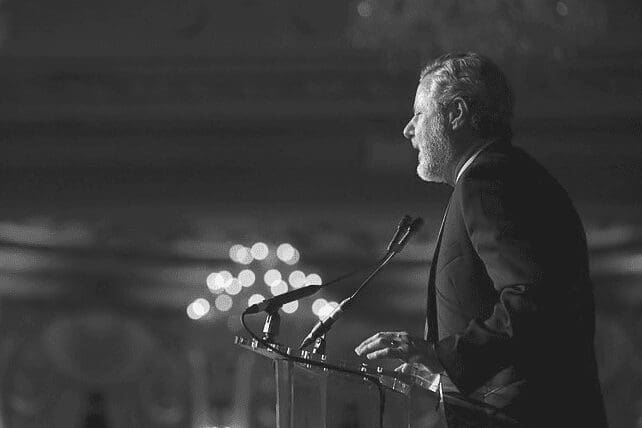Jerry Falwell Jr., former president of Liberty University in Lynchburg, Virginia and son of preacher and conservative activist Jerry Falwell Sr., made headlines earlier this week, when a Vanity Fair interview revealed that Falwell didn’t consider himself “a religious person.”
The profile focused on Falwell’s rise to evangelical stardom, from his relationship with his father to his pivotal role in bringing Liberty back from the verge of financial collapse, his remarkable success as the university’s president, which rose to greater prominence among evangelical educational institutions under his leadership, as well as the controversies surrounding his marriage and personal conduct, and his eventual departure from Liberty.
Speaking about his father’s legacy and his own fall from grace, Falwell told Vanity Fair, “It’s almost like I didn’t have a choice.” As Falwell stepped into leadership, he did so in the shadow of his father, who cofounded the Moral Majority, founded Liberty University, and planted a megachurch in Lynchburg, Virginia.
“Because of my last name, people think I’m a religious person. But I’m not. My goal was to make them realize I was not my dad,” Falwell went on to say.
RELATED: Liberty Sues Jerry Falwell Jr., Seeking Millions in Damages
As someone who served as president for an unabashedly evangelical university for over a decade, Falwell’s words came as a shock to many, and a number of news outlets reported on Falwell’s revelatory statement.
Some evangelicals have remarked about the dissonance between Falwell’s public persona as an evangelical leader and his private beliefs and practices.
“It seemed like [Falwell] was taking all that he could from his name and taking all that he could from his affiliation with Liberty, while taking as little as he could in the form of obligations, or assuming as little as he could in the form of obligation,” said David French on a recent “Holy Post” podcast episode. “And that’s a very unsustainable lifestyle. And that brings you to the tragic part of this, which is, that is a life that is set for a collapse.”
“It’s helpful to remember that public figures aren’t avatars but real people who have hurts and pains. Doesn’t mean we don’t need accountability but we should keep their humanity in mind before we use them as a way to make a point,” tweeted Daniel Darling, Director of the Land Center at Southwestern Seminary. “I think it applies to any public figure. The Falwell stuff initially triggered [my statement] but it applies to really any public figure. We tend to want to reduce them to avatars.”
One person who did not seem at all surprised by Falwell’s words was Russell Moore, director of the Public Theology Project at Christianity Today.
On Thursday, Moore released an article entitled “Jerry Falwell Jr. Isn’t a Hypocrite.” In the article, Moore argued that, based on Falwell’s words and actions across multiple years, his goals had always seemed to be more political than theological in nature.

